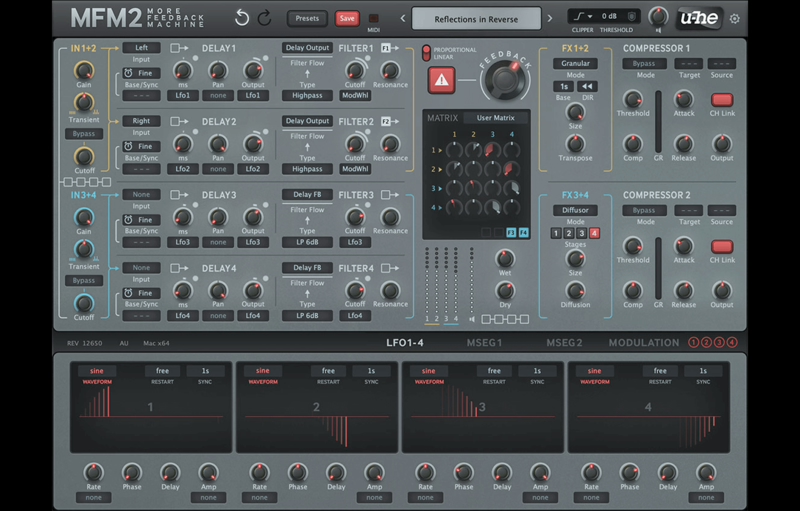Version 2.5 of u-he’s monster delay plug-in More Feedback Machine is now available.
The new version comes with a redesigned GUI, native support for Apple silicon, VST3 and CLAP (the new open source plug-in format), a new input section, new granular and diffusion effects… and quite a lot more.
The 3D circular arrangement of elements in the previous version has made way for a more practical design, and In case anything remains unclear despite the streamlined UI, users can access the user guide and other documentation by clicking on the u-he logo.
Several of the new factory presets feature the Diffusor effect, demonstrating that version 2.5 is also quite a capable reverb unit. Fans of experimental effects will also welcome the Granular feature, which includes a reverse option and host-syncable grain size.
MFM2.5 can do…
- Ping-pong and panning delays
- Filtered and frequency-shifted delays
- Chorus, flanger, resonator
- Reverb, diffusion and ambience
- Granular effects
- Degrading & distorting delays
- Ducked and compressed delays
- Endless loops
- Keyboard-controlled (tuned) comb filter
- Massive glitch effects
- Any combination of the above
2 Input Processors
Input signals can be processed in pairs before being sent to the delay lines. The “Transient” controls suppress or boost spikes. The two non-resonant input filters can reduce the frequency range or even split the frequencies into two stereo bands with independent delay settings (set In 1+2 to Lowpass and In 3+4 to Highpass with the same Cutoff value).
4 Delay Lines
Independent delay modes: synchronized, free, or even controlled by MIDI notes.
The dark field below each knob is a modulation source selector, and the amount of modulation is controlled by the “pip” which appears at the top right of the knob.
4 Main Filters
Resonant filters can be placed in various positions within the signal path. On offer here: 2x low pass, 2x high pass, band pass, band reject, allpass (phaser).
The Feedback Matrix
This is where you can specify how the delay lines feed into each other: The “User Matrix” option lets you freely route signals between all 4 delay lines.
The large control at the top adjusts the overall amount of feedback. At the bottom of the panel are the output level controls, allowing for normal and inverted polarity.
2 Effects
Pre-feedback processing. On offer here: limiter, bit crusher, phaser, frequency shifter, lowpass/highpass filter, granular pitch shifter, diffusor (reverb-ish).
2 Compressors
The final polish! Peak or RMS mode compression. In PeakComp mode you can compress one pair of channels using a sidechain from the other.
Creating new effects in MFM2 can be quite complex, depending on how deep you want to go! Below is a very brief introduction so you can get some idea of what awaits you as MFM2 tweaker…
Features
- New in version 2.5: input section with gain, filter and transient balance
- 4 delay lines with independent absolute time or tempo-synced modes
- Each delay line has its own multimode filter: 2x lowpass, bandpass, 2x highpass, bandreject or allpass
- 6 default delay configurations or user matrix (freely route signals between all 4 delay lines)
- 4 syncable LFOs with 8 waveform options or user definable shapes
- 2 syncable and loopable multi-stage envelope generator (MSEG) modulation sources
- 4-slot modulation matrix with depth modulation from a second source
- 2 channel-pair effects: soft clipper, bit crusher, phaser, frequency shifter, filter…
- New in version 2.5: granular (pitch shift, reverse delays) and diffusor (reverb)
- 2 channel-pair compressor/limiters, with peak or maximize modes
- New in version 2.5: output shield (soft clipper) with strength and threshold options
- Scalable UI from 70% to 200%
- 400+ factory presets
Mac
- Mac OS X 10.10 or newer (Intel and M1 Mac Supported) (64-bit only)
- AU2, VST2, VST3, CLAP (No Mac AAX support)
Windows
- Windows 7 or newer (32/64-bit)
- VST2, VST3, AAX (32/64-bit)
- CLAP (64-bit only)
Linux
- glibc version 2.28 or newer
Minimum Requirements
- Host software / DAW
- 1GB RAM, more recommended
- 50MB free disk space
- 1000 × 600 or larger display
- Modern CPU required
- Intel Nehalem or newer, AMD Bulldozer or newer (for Windows / Linux)
- Intel Nehalem or newer, Apple M1 (for Mac)

























